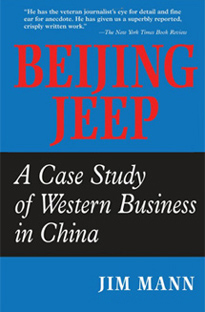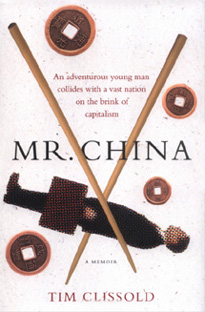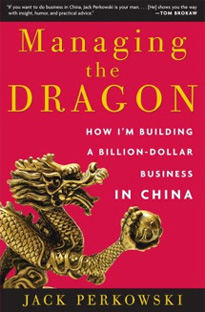The China Auto Literature Trilogy



Nov. 17 – It is always useful to read longer term accounts of earlier days in China, especially during downturns. War stories of seat of the pants exploits, problems with Chinese partners and politicians, mass corruption and theft, as well of scary accounts of mass protests when things go wrong do tend to assist with an “at least someone has been here before” recognition when trying to understand and deal with problems in China. Although the subject of China business has attracted many to write about it, only a small handful of executive written books attempt to tell the tale from the exposed perch of the foreign investor. And of these, it is little known that three well known books, “Beijing Jeep,” “Mr. China” and “Managing the Dragon” are in essence a trilogy telling the evolution of the same story.
The tale actually begins with Jim Mann’s book “Beijing Jeep,” which details the start up of the first automotive JV in China, American Motor’s (AMC) 1979 foray. AMC was a small, nearly broke manufacturer with one, outdated product, the Jeep, and they raised eyebrows among the bigger players when they signed up for their venture with Beijing Auto. These were early days in China, foreign investment laws were embryonic, and much of the development of the business was affected by continuing local government interference. The book introduces a character featured in all the titles—Don St. Pierre Sr.—at the time a busy AMC executive, charged with much of the management of the JV. The lessons learned from the book are mainly to do with managing Chinese staff and the Communist Party apparatus, although the latter requirement has now dwindled somewhat, the experiences a new-to-China St. Pierre faces are salutary lessons. AMC are eventually absorbed into Chrysler, with a completely out of his depth Lee Iaocca managing to upset everyone as the American savior to the situation only making matters far worse.
The second volume, Tim Clissold’s “Mr. China,” essentially continues the story, although for legal reasons many of the executives’ names in the book were changed. Jack Perkowski, for example is the Wall Street banker, while Don St. Pierre Sr., newly fired by Chrysler, is the development manager. Clissold is the de facto CEO as ASIMCO enters the China market, pick up on a lot of Beijing Jeep’s problems as what not to do, but naively also hire a lot of their senior management. Familiar problems surface with the management of Chinese relationships as old AMC attitudes remain, and the company finds itself lurching from crisis to crisis, including the theft of significant amounts of money. Perkowski, initially bemused by it all and totally out of his depth, learns fast, and to his credit, has the guts to go back to Wall Street and refinance what has been a disastrous initial foray into China. He also starts wielding the axe and begins the process of rebuilding his business from the ground up—having learnt a US$400 million lesson in the process. It’s a harrowing tale, however Clissold doesn’t quite manage to hold up his hand and admit personal mistakes, resulting in a book that leaves other parts of the story untold or covered over. It’s also a part gleeful, part rueful account of the financial losses that somehow grates, and despite being the most popular of the trilogy, is flawed from his sole perspective and lack of understanding of the Wall Street involvement.
How that story is continued and told from a different perspective, complete with management tips and advice, is contained within Jack Perkowski’s own book on the ASIMCO tale, “Managing the Dragon.” Perkowski revisits ground covered in “Mr. China” from his perspective, then shows his strategy for developing ASIMCO into a billion dollar business (2007 turnover was just over US$500 million). Tim Clissold’s performance is examined, as is that of Don St. Pierre Sr., neither come out of Perkowski’s recollections particularly well, and here the book does descend into hyperbole momentarily as one detects the sound of scores being settled. That said, it’s a small criticism, and given that Beijing is a small city amongst the long term expatriate community and that all the players still reside there, perhaps slightly amusing. Of more interest is the manner in which Perkowski sets about correcting horrendous problems, and takes charge. Sweeping away previous management, and discarding long held, almost racist attitudes towards doing business in communist China by them, it is only then that ASIMCO starts to yield it’s true potential. Perkowski’s account is probably the most professional as well as contemporary and pertinent to the boardroom executive.
And the story isn’t over. ASIMCO’s China strategy is evolving, and with Perkowski still chairman, a rather different approach to that laid out in “Managing the Dragon” is starting to influence the companies operations. Who will write that continuation of the saga remains to be seen. These books then are really best read as a trilogy, as only then, rather than as separate volumes do we get the entire picture, and uniquely, told from different perspectives and styles. While all remain important, they do have significant individual identities, and can be summarized as follows:
Beijing Jeep:
The history lesson: what it was like in the good old bad old days.
Mr. China:
The novel: written from first hand experience, but reads more like a thriller.
Managing The Dragon:
The executive guide: the CEO’s version of how to do business in China.
Which to Buy?
All of them, but do it in order.
Where are they now?
Don St. Pierre Sr. is the founder and chairman of ASC Fine Wines, the largest wine importer in China and is still based in Beijing. His son, Don St. Pierre Jr., is the managing director.
Tim Clissold is a director of Peony Capital, the Bill Gates-funded carbon trading fund based in Beijing.
Jack Perkowski is the chairman of ASIMCO Technologies and is based in Beijing. He is the only senior executive named within the books still involved with the auto industry.
- Previous Article China in Asia Regional Round Up: Nov. 17
- Next Article UNDP Report:China Should Provide Basic Public Services for All Its Citizens










